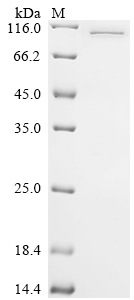This recombinant human DNA polymerase theta (POLQ) boasts a purity of greater than 85%, as verified by SDS-PAGE. It is produced in E. coli through the expression of the gene encoding the 1820-2590aa of human POLQ and the C-terminal 6xHis-SUMO-tag gene. Available in liquid and lyophilized forms, this recombinant POLQ protein is ideal for research involved in epigenetics and nuclear signaling, offering reliable and consistent results in experimental applications.
Human POLQ is a unique enzyme that plays a critical role in DNA repair processes, particularly in the context of double-strand breaks (DSBs). POLQ is primarily involved in the repair of DSBs through TMEJ, a process that utilizes microhomology to facilitate the joining of DNA ends. This mechanism is particularly significant in cells that lack homologous recombination capabilities, as it provides an alternative means of repairing DNA damage [1][2]. TMEJ is characterized by its reliance on short homologous sequences, which POLQ can extend to facilitate the joining of broken DNA ends [1][2]. This low-fidelity repair process is notable for its potential to introduce mutations, contributing to genomic instability, which is often observed in cancer cells [3-5].
Moreover, POLQ's ability to synthesize DNA with low fidelity is a double-edged sword. It enables the repair of critical DNA breaks, while it can also lead to increased mutation rates, which may drive tumorigenesis [3][6]. The overexpression of POLQ has been linked to poor prognosis in various cancers, including breast cancer and lung adenocarcinoma, underscoring its role in cancer biology [3][4]. Additionally, POLQ's involvement in telomere maintenance and fusion processes highlights its broader implications in genomic stability and cellular aging [7][8].
References:
[1] J. Kamp, R. Schendel, I. Dilweg, & M. Tijsterman, Brca1-associated structural variations are a consequence of polymerase theta-mediated end-joining, Nature Communications, vol. 11, no. 1, 2020. https://doi.org/10.1038/s41467-020-17455-3
[2] T. Hwang, S. Reh, Y. Dunbayev, Y. Zhong, Y. Takata, J. Shenet al., Defining the mutation signatures of dna polymerase θ in cancer genomes, Nar Cancer, vol. 2, no. 3, 2020. https://doi.org/10.1093/narcan/zcaa017
[3] G. Higgins, A. Harris, R. Prevo, T. Helleday, W. McKenna, & F. Buffa, Overexpression of polq confers a poor prognosis in early breast cancer patients, Oncotarget, vol. 1, no. 3, p. 175-184, 2010. https://doi.org/10.18632/oncotarget.124
[4] G. Rodríguez-Berriguete, M. Ranzani, R. Prevo, R. Puliyadi, N. Machado, H. Bollandet al., Small-molecule polθ inhibitors provide safe and effective tumor radiosensitization in preclinical models, Clinical Cancer Research, vol. 29, no. 8, p. 1631-1642, 2023. https://doi.org/10.1158/1078-0432.ccr-22-2977
[5] R. Wood and S. Doublié, Genome protection by dna polymerase θ, Annual Review of Genetics, vol. 56, no. 1, p. 207-228, 2022. https://doi.org/10.1146/annurev-genet-072920-041046
[6] W. Koole, R. Schendel, A. Karambelas, J. Heteren, K. Okihara, & M. Tijsterman, A polymerase theta-dependent repair pathway suppresses extensive genomic instability at endogenous g4 dna sites, Nature Communications, vol. 5, no. 1, 2014. https://doi.org/10.1038/ncomms4216
[7] S. Ahmed, E. Lister-Shimauchi, M. Brady, S. Frenk, B. Harris, A. Ortizet al., Rtel-1 and dna polymerase theta promote subtelomeric dna synthesis and telomere fusion in c. elegans,, 2022. https://doi.org/10.1101/2022.09.04.506531
[8] J. Chen, Faculty opinions recommendation of brca1-associated structural variations are a consequence of polymerase theta-mediated end-joining.,, 2020. https://doi.org/10.3410/f.738340967.793577267






